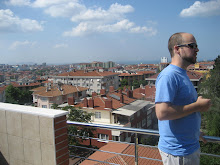The doctrine Edwards sees in Peter's description of his audience's attitude through trials is "True religion, in great part, consists in holy affections." (p.236) Obviously, from yesterday's entry, the affections Edwards noted are live and joy. Before we go much further, it is becoming increasingly important that we define "affections". Edwards agrees; he defines it as, "the more vigorous and sensible exercises of the inclination and will of the soul." (p.237)
So then, there are two faculties, or capabilities, of the soul, according to Edwards: the understanding and the will. The understanding is used to observe the world through sensory input. The understanding is also employed to discern the input it receives. (p.237) The will, which Edwards also calls "the inclination", is not "an indifferent unaffected spectator," but is used to identify input as approved or rejected. (p.237) In summary, I use my understanding to experience the world around me. My will is employed to take actions based on my understanding. (This two-step mode of operation seems logical to me. However, it would be helpful to read secular philosophy on the point and have something to compare, and contrast, Edwards to.)
As for the will, obviously, it either approves or disapproves of the input it receives. Simple life experience shows that the will is sometimes very close to apathy as regards this input. Other times there are strong inclinations and thus decisive actions are taken. (p.237) It is in regards to these stronger inclinations, that the heart comes into play. Edwards means the actual, blood-pumping organ. (After all, without juices flowing through our body, the entire process is not possible.) However, he also connects and identifies the heart with the mind, which will be more clear in a moment.
So then, here is the chain of events: First, we experience the world through our senses; second, our understanding acts as a kind of sorter, a processor, that discerns the input our senses receive; third, our will is either inclined or disinclined towards the input it receives; And, fourth, our mind and heart, in tandem, make decisions and take actions, respectively. (p.237) Again, as regards these actions, it can be said that the heart is the first mover of these actions, not the mind, because it is from the heart that the inclination, or the will, is sprung. This brings to mind a bit from a memory passage from this morning - Prov.4 - Keep your heart with all vigilance for from it flow the springs of life.
Subscribe to:
Post Comments (Atom)

No comments:
Post a Comment